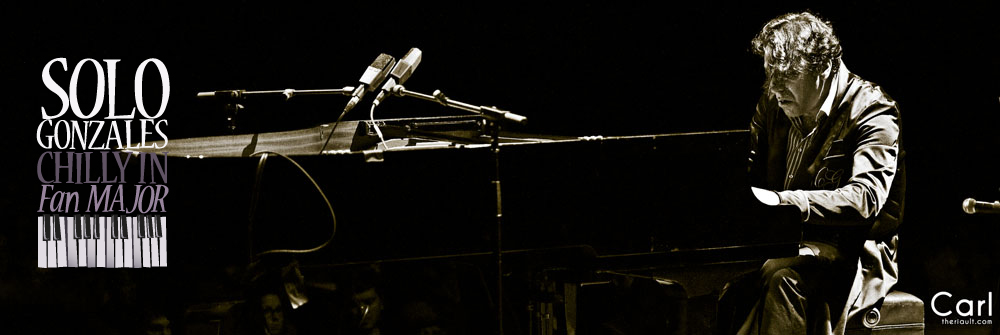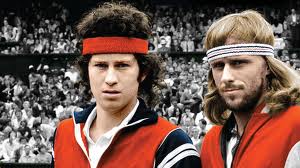Man, this is war – where careers get killed and that’s not a metaphor – Gonzales Never Stop (Rap version)
War and conflict has and will always occur between predators and prey, rivals for mates, siblings, and even between parents and their offspring. While it’s possible that our species could have arrived where we are today in the absence of conflict, historical evidence overwhelmingly supports the notion that conflict played a huge role in establishing the relatively peaceful lifestyle we enjoy today. The problem is that we’re still ‘wired’ for conflict – we haven’t quite ‘given up the fight’. This is especially evident sporting events, where the struggle on the field emulates a ‘mini-war’ of sorts. In the same vein, life’s struggles weren’t lost on composers, who seem to constantly try to capture conflict within music and opera. The entertainment value of conflict within sports and music hasn’t escaped Gonzales, as he recently told Thomas Bärnthaler of Germany’s Süddeutsche Zeitunh Magazin:
I’ve written something new; a mixture of opera and musicals that I might soon premiere in Munich. It’s about John McEnroe and Bjorn Borg and their epic tennis match at Wimbledon in 1980. The piece is called « Tiebreak » and goes deep into the psyche of both players during the legendary tiebreak as they watch each other, what goes through their head.
When John McEnroe made his appearance at the classic 1980 Wimbledon tennis final, McEnroe was booed. Someone who could elicit such emotion from a traditionally ‘stiff’ crowd likely caught the attention of Gonzales. Tennis – an ‘upper-crust’ sport – has a revered history of passionate, yet civilized play. Along comes McEnroe, who elicits passion from the fans (mostly negative), by completely going against the grain of how we think tennis players should behave. This was war on the tennis court – and the International Tennis Federation benefited from the drama, ratings, passion, and new viewers. McEnroe’s antics re-energized a sport that was languishing, and singlehandedly motivated a new generation of future tennis stars. In a perfect world, the ‘best’ tennis player should provide plenty of motivation, but top-level play without any controversy can be uninspiring to outsiders, who aren’t particularly attracted to the game.
The corollary in music would be an outsider to classical music; traditionally stuffy and boring, people require a reason to listen in – someone who can entertain, educate, and make the connection between classical and pop (hint, hint). The spectre of competition in sports is unavoidable. But Gonzales is an entertainer. As such, his self-imposed duty is to exaggerate not only components of his personality, but potential sources of conflict, such as struggles between political classes, and tell them in a story channelled though music.
Gonzales summarized the ‘entertainer’ side of Liszt in a tweet (on Liszt’s birthday):
I don't listen to much Liszt but as a performance innovator he is #1 . He invented the James Brown fainting / being rescued in a cape thing
— chilly gonzales (@chillygonzales) October 22, 2013
The « Cape Routine » as it is known, represents a struggle of sorts, but more in the vein of an entertainer giving it their all – right up to the point of physical exhaustion, only to be re-energized through the love of fans, and discover new found strength to carry on right into an incredible encore. As part of the routine, a roadie enters the stage with a cape, which is used to cover up the obviously ailing singer (who eventually shakes off the robe). The choice of a cape or robe is an interesting one. In interviews, James Brown indicated that his ‘cape routine’ was gleaned from a wrestler called ‘Gorgeous George’.
Gorgeous George was a legendary wresting heel (hustlers by nature), who developed an incredible persona – someone who was completely infatuated with looks and wealth. Besides donning a different custom-made luxury robe every match, Gorgeous George took great pride in his personal appearance, much to the chagrin of wrestling audiences. His pre-match routines would elicit boos and cat-calls, but also fill the seats with record crowds. Much to the dismay of his opponents, Gorgeous George was an incredibly talented wrestler, which meant that he could back-up all the bravado with an incredibly entertaining display of wrestling. George also admitted that he ‘lifted’ his robe routine from another wrestler – Lord Patrick Lansdowne Finnegan who appeared on stage with servants who were severely admonished if they did not fold his robe in a precise manner. In turn, Lord Lansdowne was inspired by professional boxers, who initially donned robes to ensure that they remained warmed-up for maximum performance. Eventually, robes with hoods were used executioner-style to intimidate opponents. Oddly enough Mike Tyson purposefully refused to wear a robe to gain a psychological advantage over his opponents.
All this talk of robes, conflict, and entertainment naturally brings us back to Gonzales, who also dons a robe. Presumably, there are multiple factors at play. First, a robe is something that one would wear while relaxing at home, which increases the level of intimacy between Gonzales and the audience. Second, wearing a robe in public is a huge social taboo in France (and presumably much of Europe). In Paris, you apparently have to dress up to take the garbage out, so wearing a robe in public is definitely a sign of someone who has no use for social convention. Lastly, the robe signifies a warmed-up state prior to a fight. In this case, the fight is multidimensional: Gonzales versus the piano, entertainer versus artist, contempt for the audience versus gaining adoration, America versus Europe, Liszt and Rubenstein versus Horowitz and Gould, and so on. There is entertainment and passion in conflict; the highs and the lows are expressed not only through Gonzales’ words on stage, but more effectively in the raw emotional power of his music. As Andy Kaufman once said:
Pure entertainment is not an egotistical lady singing boring songs onstage for two hours and people in tuxes clapping whether they like it or not. It’s the real performers on the street who can hold people’s attention and keep them from walking away.
Gonzales certainly captures an audience’s attention. In fact, one has the distinct impression that he’d like to venture farther out into the territory of ‘audience abuse’. More alienation of the audience would provide the opportunity to win back the audience through incredible music in the same way that Gorgeous George would win back the audience through wrestling prowess. Alas, the entire notion of setting up a love-hate relationship with fans seems lost on European audiences, who may only be regularly exposed to the antics of soccer players taking dives, which is too bad, because a dynamic audience relationship is even more entertaining than pure adoration. It would seem that European audiences resent being ‘pushed away’ too strongly, which limits Gonzales’ message to some degree. it’s difficult for Gonzales to break centuries of classical and opera tradition, but he’s full of surprises, which means that he may come out swinging at an upcoming concert.
Back to tennis. Eventually, McEnroe defeated Borg to win the U.S. Open, and Borg announced his retirement from tennis shortly thereafter. Today, McEnroe has made a successful career out of being an ‘outraged outsider’ – something that has translated into book deals and television appearances. He’s embraced his past and parlayed it into longevity and exposure to a new generation. How the struggle within the 1980 match will be portrayed within Gonzales’ sports opera and musical remains to be seen, but it certainly sounds fascinating and entertaining. It also may represent the first time opera, musicals, and a defining sports event have ever been unified into a single vision.
There is an underlying message in Gonzales’ conflicts and struggles. From one perspective, he’s saying we are partially defined though struggle. From another perspective, he’s encouraging us to embrace and even enjoy struggle – reach our inner hustler, so to speak. Many business owners will fondly look back to when their business was struggling – once the business becomes successful, they become bored and quit to tackle new challenges. Even someone who is a respected musical genius struggles with issues each and every day – just like the rest of us. To sit atop success and look back is akin to giving up the fight – the very same fight from deep within that drives us to better ourselves and the world around us, and as the song says, “Never Stop”.

